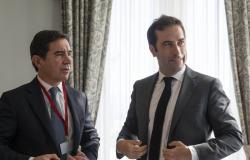Bratislava, Slovakia (AP) – Slovakia’s populist leader criticized the European Union plan to stop Russian natural gas imports by the end of 2027 in order to deprive President Vladimir Putin of income that helps finance the war in Ukraine.
The European Commission, the executive arm of the block, will present a detailed plan next month. It will seek to prohibit new gas contracts with Russia by the end of this year and gradually eliminate existing existing ones that are still used in the EU of 27 nations by the end of 2027.
The Slovakia Prime Minister Robert Fico said that the plan is “absolutely unacceptable” for his country and that his government is ready to veto it. He said that the measure would be harmful to Slovakia and the entire EU, since the price of gas will increase as a result.
Slovakia has a gas supply agreement with Russia that expires in 2034, and Fico said it would seek compensation for damage if the plan continues.
The president of the European Commission Ursula von der Leyen, who is promoting the plan, told EU legislators that Russia has demonstrated again and again that she is not a reliable energy provider.
“Russia’s agency is not only bad for our security, but also for our economy. Our energy prices cannot be dictated by a hostile neighbor,” members of the European Parliament in Strasbourg, France told members.
-FICO also rejected a proposal to stop the imports of Russian oil and nuclear fuel to the European Union.
Hungary and Slovakia, whose leaders are considered the closest allies of Putin in Europe, have blocked EU military assistance to Ukraine and expected to oppose the gas plans of the European Commission.
Fico, a divisive figure both in his country and abroad, returned to power in 2003 after his leftist party Smer (direction) won a parliamentary choice with a pro-Russian and anti-state platform. Known for his pro-russia opinions, he has openly challenged EU policies over Ukraine.
It is expected to become the only EU leader to travel to Moscow for Friday’s festivities that mark the 80th anniversary of the defeat of Nazi Germany in World War II. It will be his second trip to Moscow since December.
His government has faced vocal protests against his safestation and other policies.
This story was translated from English by an AP editor with the help of a generative artificial intelligence tool.






